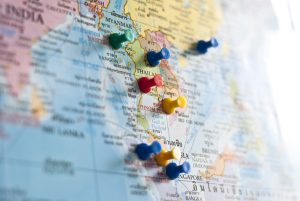China seems to have asserted itself as the power behind BRICS in recent weeks, but closer to home Beijing is flailing. It is struggling to find support in Southeast Asia, where leaders are prepping for the annual ASEAN summit in Jakarta.
That follows a solid year for Indonesia as ASEAN chair. Jakarta took a harsher stance against the military dictatorship in Myanmar than previous chairs, but the realities of that failed state require a global response – not unlike the United Nations intervention in Cambodia in the early 1990s.
Indonesia also thumbed its nose at China and its proxy, Cambodia, by staging ASEAN’s first naval drills. It pushed forward on an ASEAN Code of Conduct for dispute resolution in the South China Sea and committed to organizing the ASEAN Indo-Pacific Forum.
Jakarta also scored high marks by putting human trafficking higher on the agenda and winning a commitment to using ASEAN currencies in trade transactions. In doing so Indonesia succeeded in asserting ASEAN as a central power structure of necessity in the region.
But measuring success is tricky when ASEAN chairs are increasingly defined as having a good or bad year based on how they either stand up for the bloc or appease China – a diplomatic oddity given China is just one of 10 dialogue partners; New Zealand, Canada, and India among them. For China, it was always going to be difficult to wield influence among the 10 ASEAN countries amid a faltering economy at home and an end to the heydays of its Belt and Road Initiative abroad.
Much of it remains theatrics, but this year China’s performance fell short of its grand designs, noted by newly reappointed Foreign Minister Wang Yi’s whistle-stop tour of Singapore, Malaysia, and Cambodia ahead of the September 5-7 ASEAN leaders’ summit.
Why those three?
Singapore has a shared ethnicity, but that’s not the basis for its foreign policy. Malaysian Prime Minister Anwar Ibrahim is an unknown on the diplomacy front and he might be worth cultivating. Then there was Cambodia – with its hands out – China’s chief ally.
Of Beijing’s loose friends and proxies, Myanmar is a pariah. Laos is also being referred to as a failed state in some quarters given its tragic economic policies and dependency on Chinese largesse. Brunei is also in need of currency, but its influence hardly extends beyond Borneo.
Hunter Marston, a Southeast Asian academic with Australia National University, put it best, saying China was keen to shore-up goodwill with the more pliable partners in the bloc while isolating Western-leaning countries at the same time. The Philippines is the most prominent example of the latter group, with President Ferdinand Marcos Jr. having executed a striking pivot toward its long-time ally, the United States.
Wang is “probably making the Philippines feel a little bit out there on its own,” Marston said of the Chinese foreign minister’s three-country Southeast Asia tour. “In some ways, the trips to Malaysia and Singapore are a lot more comfortable places for China to visit in light of Marcos Jr.’s overtures to Washington.”
Under former President Rodrigo Duterte, the Philippines lurched toward China but it is back to basics with Marcos in charge. Manila is also negotiating a maritime cooperation agreement with Hanoi amid ongoing confrontations between Chinese and Philippine vessels in the Spratly Islands.
Beijing wants Manila to remove a scuttled naval vessel used as an occupied base on Second Thomas Shoal. As Wang toured neighboring Southeast Asia, China’s official Xinhua news agency kept reminding Marcos that China has repeatedly expressed its willingness to resolve its differences with the Philippines through bilateral dialogue.
The five ASEAN countries – Philippines, Vietnam, Brunei, Indonesia, and Malaysia – with overlapping claims in the South China Sea are eschewing bilateral dialogue with China over such disputes and would prefer an established Code of Conduct that favors the bloc as a whole.
Understandable, given the 2016 ruling by an international arbitral tribunal in The Hague fully rejected Chinese claims in the South China Sea. Beijing prefers to ignore that ruling and insists on bilateral talks, where it will invariably have the upper hand.
Indonesia had a plan and executed it well in 2023. However, China will have the upper hand next year when Laos takes its turn at the wheel, meaning any momentum built up by Indonesia on behalf of ASEAN interests will be pushed aside to suit China.
































